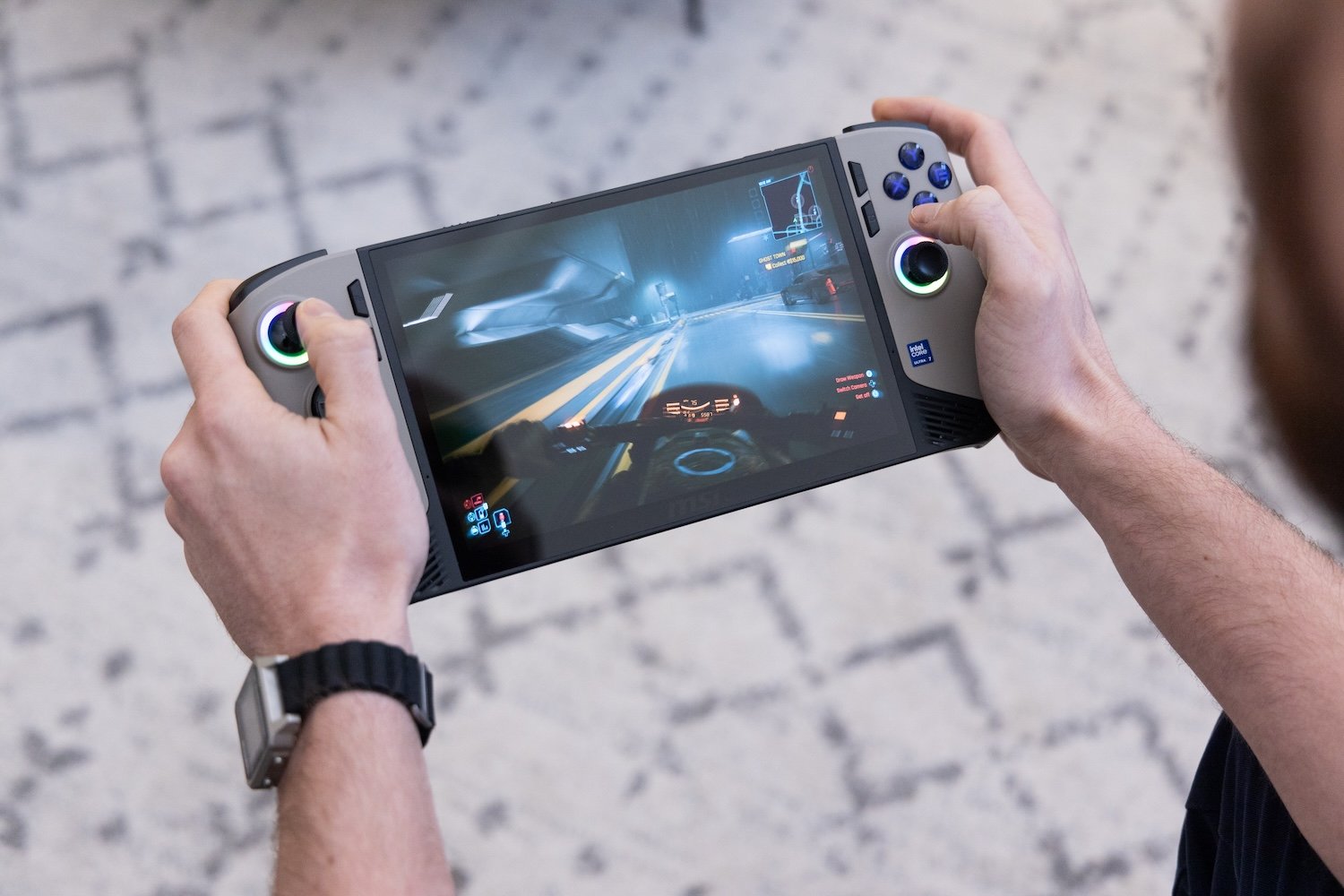If I told you “The Claw” was being redeemed, would you first think of the Inspector Gadget villain or MSI’s hard-pressed handheld from earlier this year? Gizmodo and many other reviewers derided the MSI Claw A1M model for its lackluster performance and controls that didn’t match up to other handheld PCs. In my mind, its worst sin was its price. At the top end, the old 7-inch claw demanded $800. That’s what you currently pay for our pick for the best Windows-based handheld, the Asus ROG Ally X. So how does the all-new, bigger, pricier MSI Claw 8 AI+ stack up?
First off, the Claw 8 AI+ costs $900. It now has to justify being one of the most expensive gaming handhelds from a major PC OEM. For that ballooning price, the Claw now has a bigger screen at 8 inches (the same size as the $750 Lenovo Legion Go), a completely renovated design, and an all-new chip, the Intel Core Ultra 7 258V. Compared to the Core Ultra 7 155H, the new Intel Arc 140V graphics is much better than the previous generation. Adding to the fun is the Claw 8’s 80 Whr battery capacity, like the Ally X, plus 32GB of RAM. It still demands a big chunk of change, especially considering the Steam Deck OLED is $250 cheaper than the new Claw with the same 1 TB SSD storage.
MSI Claw 8 AI+
The MSI Claw 8 AI+ has solid performance in some demanding games and fair battery life, though its software still needs work.
Pros
- Solid performance in many demanding games
- Good screen and surprisingly loud sound
- Battery life with 80 Whr capacity will help you game for longer
Cons
- Center M software is rather glitchy
- Controls don’t feel sized for smaller hands
- It’s a heavy device that may not travel as well as other handhelds
Intel’s Lunar Lake chips have the added benefit of being largely better on battery life than many other x86 CPUs on the market. In our tests, the 258V also proves that it can get better framerates at 30 TDP than the AMD Z1 Extreme chip that’s so prolific among 2024’s gaming handhelds. The difference will be more stark in some games compared to others. If you’re looking for the most powerful handheld with a big screen, the MSI Claw 8 AI+ is a contender. Then again, there’s the OneXPlayer Onexfly F1 Pro with up to a Ryzen AI 9 HX 370 floating about if you want to spend upwards of $1,600 or $1,700 on a handheld. At a point, there’s a hard limit to what a reasonable price for a handheld PC is.
If the large ergonomics are for you, then know the MSI Claw 8 AI+ is a few updates from being a truly solid handheld. The Center M software has been modified from its original rendition, and it’s now far easier to access your games and change user scenarios than before. Unfortunately, the system keeps reverting to desktop controls and ignoring all the controller’s buttons. Sometimes, it would require a quick restart before the device remembered it was a handheld.
I have average-sized hands, but something about the Claw’s design lands too close to its namesake. If I was getting a handheld for my father’s sausage fingers, I might consider the Claw 8 first. If you want to use your talon-like hands to scrape every last frame from your handheld, the new Claw will do the job. As for how long that crown will stick atop MSI’s head, that may depend on how 2025’s APUs shape up. Despite all that, the Claw is indeed redeemed, though, like all good anti-villains, it still has its rough edges.
The Claw 8 AI+ is currently up for preorder and will ship on Jan. 15, 2025.
MSI Claw 8 AI+ Review: Design and Controls

The first thing you’ll realize about the Claw 8 is that it’s a heavy and extra thick handheld. You’ll want to work on your forearm muscles, as the Claw 8 weighs 795 grams or 1.75 pounds. It doesn’t sound like much until you’re holding it up for minutes or hours at a time. It is a solid slab of gaming potential, but to keep it aloft when lounging back on the couch, I felt the need to let it rest on my lap during a multi-hour gaming session. That’s where the ridges on the back edge of the device come into play. The previous claw had an issue where your fingers would sit on the rear vents, which is no longer true on the Claw 8. The back buttons are also flatter, and each has a clicky-er feel than before.
The triggers on the Claw 8 are much more “trigger”-like than you would find on the Ally or Steam Deck. Due to the size of the handles, it can actually feel slightly uncomfortable to reach around and grip them when playing any kind of shooter. At the same time, the left and right bumper buttons feel much, much better than the original Claw. MSI redesigned the shoulder buttons to click downwards, instead of inwards, and the result is a better time in games like Warhammer 40K: Space Marine 2 which demands you smack the the shoulders for all your melee attacks.
The face buttons are more rounded than the Ally X, but thankfully MSI maintained the RGB lights behind the A, B, X, and Y. The d-pad has also been made far more pronounced, which makes it far easier to use without looking. The controls are a mixed bag. I appreciate the feel of the Hall effect thumbsticks and most buttons save for the triggers, but everything also feels like its spaced too far apart for my fingers.
The controls weren’t the only thing to receive an overhaul. Center M, the software that papers over the flaws when using a Windows 11-based handheld, now sports a more clean look. There’s easy access to all the most popular launchers and a new quick settings menu that lets you change power settings, keyboard, WiFi, and Bluetooth settings on the fly. Additionally, the new menus incorporate Xbox Game Bar and Xbox Social.
The connection to Xbox could be great news for those who like to switch from Xbox to PC, but I’m mostly interested in what other widgets we may eventually be able to add from the built-in widget store. It’s all a significant improvement on what came before, but as I mentioned, I’ve come across several issues with the device automatically switching to PC controls and not recognizing my face buttons. This may occur if I accidentally tap the screen, but with an 8-inch display that seems a likely scenario for most users. I’ve also encountered random glitches with Center M that made it unusable and required I restart the program.
These issues are something that will likely be patched in time, but it goes to show how much extra work these Windows handhelds require to make them usable. There’s a reason the Steam Deck remains so popular. Asus and Lenovo have head starts, and both their software suites do a fair job of letting you access your games and ignore the Windows desktop. MSI is almost there, but it still needs some more TLC.
MSI Claw 8 AI+ Review: Performance

MSI really needs the Claw 8 to hit high benchmarks to justify its price tag, and at least in that way, the company’s handheld delivers. If you compare the Claw 8 to the Claw A1M, the new device manages to beat it’s older brother by a little less than 700 points in 3D Mark Time Spy and by around 800 points in 3D Mark Steel Nomad tests. While plugged in running at max 30W TDP, the ROG Ally X will do 3,538 on Time Spy with the latest updates. The Claw 8 hit 4,437.
Those benchmarks take a backseat to in-game performance. In Cyberpunk 2077 benchmarks, running on Steam Deck settings with either Intel XeSS or AMD FSR, the Claw 8 managed to hit 52 FPS while running at the Ally’s max 1920 by 1080 resolution. You get slightly less at the Claw’s max 1920 by 1200, but not enough to make a difference in scores. It’s a similar story to benchmarks in games like Assassin’s Creed Valhalla and Shadow of the Tomb Raider, where the Claw 8 could outperform the Ally X by between 5 to 10 FPS with the same settings.
Then comes true in-game performance, and that’s where the lines between handhelds start to blur. You will get solid performance in all your typical 2D action titles. A game like Hades II looks incredibly vibrant on Claw’s large 8-inch display. Modern 3D games are a mixed bag. Remedy’s Control on medium settings would sit around 30 to 35 FPS in large arena areas. Baldur’s Gate III under high settings could still do 30 to 40 FPS in Act I with AMD FSR. You may have to dial graphics back slightly to get playable framerates in the city of Act III.
I did not have the time to test loads of different games on MSI’s latest handheld, but what I could test was a mixed bag. Unfortunately, you won’t get a very demanding new title like Indiana Jones: The Great Circle to run above 30 FPS on the Claw 8, even when dialing back the resolution. Then you have to consider how you’ll give up mobility for the sake of playing games at their top level. A game like Warhammer 40K: Space Marine 2 will run at just above 30 FPS with low settings at the max resolution. That’s not much better than the Ally X.
Those framerates are always why I tell people to curb their expectations with handheld PCs. Sometimes, that extra power makes a difference. In other cases, you are still limited by the lack of discrete GPU. The Claw’s $900 asking price is already way too close to a good, budget-end gaming laptop. Taking the Claw off power, the system was running at around 30 W of CPU power but was doing a total of 45 W to handle the fans. It may still play fine, but with those fans going you’re going to lose out on battery.
MSI Claw 8 AI+ Review: Battery Life

Along with the Intel chip, the Claw 8’s other headline feature is the 80 Whr battery and support for 64W charging through twin Thunderbolt 4 ports. The capacity is equivalent to the Ally X. The Intel Lunar Lake chips have proved they’re relatively power efficient. MSI claims you should get around four hours of battery life in “extended use,” but anybody with handheld experience knows this will drastically change depending on the game you play.
In my session of Warhammer 40K: Space Marine 2, I played it off power continuously at 30W for a little more than one hour and 30 minutes before I was sitting at 10%. That’s already a relatively strong lifespan for a demanding game. At the same time, you may be better off streaming these titles to your handheld, which in my experience not only grants you far better framerates but can push the battery life well past the four-hour mark.
I continued my game of Metaphor: Refantazio I’ve been happily playing through on my Steam Deck OLED over the last several months. On its automated “AI engine” scenario, the Claw 8 managed to hold out for three hours from full before demanding I plug it in. I can normally get around two hours of the same game at lower-detailed settings with Valve’s handheld.
Even with the larger screen, the Claw 8 can hold its own with the larger capacity of the Ally X. Just remember that just because it’s running with a 80 Whr capacity doesn’t mean it will get twice as much battery life as those with a 40 Whr battery, especially when you’re trying to get every ounce of power from this small-form gaming platform.
MSI Claw 8 AI+ Review: Screen and Sound

I don’t have that burning need for a larger display on my handhelds, but at least the MSI Claw 8’s IPS LCD screen is a fine thing to look at. It’s plenty bright as well. The Claw 8’s VRR display goes up to 120 Hz, which was especially handy in a game like Hades II which can actually hit those framerates.
What’s more is you do get a fair amount of screen on the Claw 8. The bezels are, on the whole, slightly smaller than a Steam Deck or ROG Ally, at least on the top and sides. It’s closer to the bezels on the Lenovo Legion Go, and if the point is to maximize screen real estate, then MSI has done the job admirably.
What surprised me most about the Claw 8 AI+ was the sound quality. The dual 2W speakers aren’t going to hold their own to full, dedicated speaker setups, but the Ally is still loud for its size. The handheld blasted sound to a room-filling degree.
Is it what you want to listen to for $900? Probably not. You’ll still hear some hollowness from high-frequency pitched sounds. It won’t be nearly as good as a pair of headphones paired with the visuals. Still, the production is quite good for its size. While listening to the impeccable soundtrack of Metaphor: Refantazio, I didn’t feel the express need to dive for my earbuds like I usually do playing on some other handhelds.
MSI Claw 8 AI+ Review: Verdict

The MSI Claw 8 AI+ makes up for many of the mistakes of the Claw A1M. It’s a big handheld, but it’s solid if big is what you’re looking for. The Center M software will need to improve with time, but even when it does, I’m not sure if 8-inches is the right size for me. The 7-inchers like the Ally X and Steam Deck feel more ergonomic in my hands. Even better, the smaller handhelds are more portable, and I prefer to travel light.
There’s talk about the AMD Z2 APU launching next year. The Z1 is already plenty powerful enough for most gamers’ needs, so there’s hope a redesigned APU will be the new benchmark. Recent leaks mention the new Z2 Extreme chip could have 12 RDNA 3.5 cores with architecture based on the quality Strix Point series. We might guess that chips’ performance, but the real reveal requires some more patience from consumers.
If you don’t want to wait, and you specifically demand the biggest handheld screen, the MSI Claw 8 AI+ is one of the few devices that I can say is close to the peak of what’s currently available. Knowing the rumor mill going into 2025, that may not last. I don’t suggest you live your life based on FOMO, though it wouldn’t hurt to wait until we see what new kinds of rumored Lenovo handhelds may arrive soon.







